THE DESPERATE TIGHTROPE WALKING OF PEDRO SÁNCHEZ
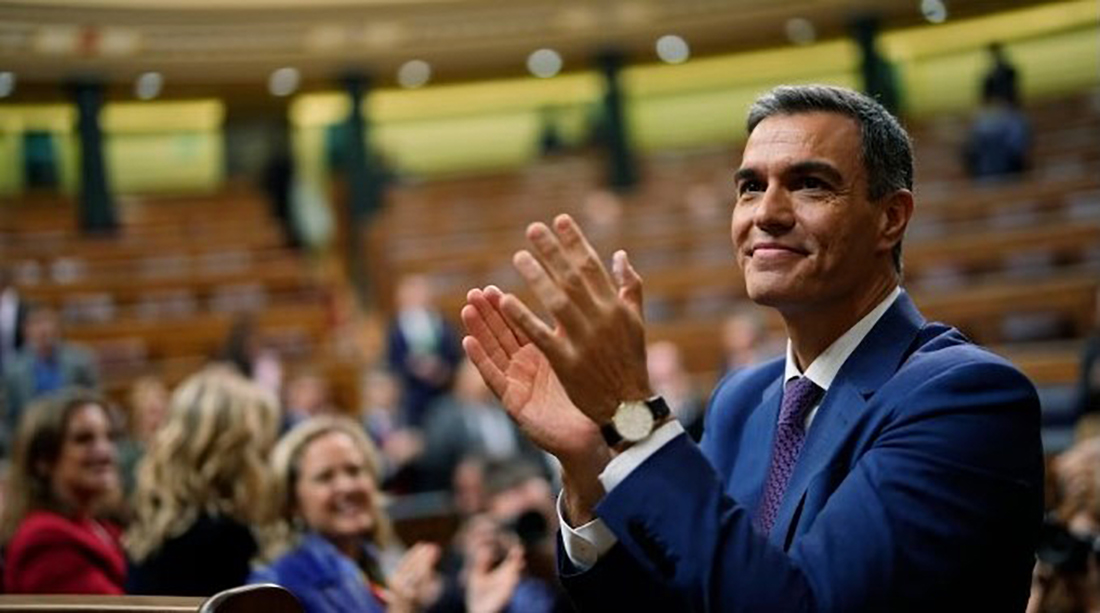
16 November 2023: Socialist leader Pedro Sánchez of the Spanish Socialist Workers’ Party (PSOE) becomes the president of the government of Spain for the third time. After having feared for his political career, which was dangerously on the decline, he manages to pull off a miracle of sorts in six months, overturning electoral forecasts despite not obtaining a majority of votes. But the price to pay to remain at the head of the country is very high, so high that democratic Spain wakes up in the aftermath of the vote with an unprecedented political shattering.
If the result is also the result of the difficulties of the Popular Party unable to coalesce the smaller forces, for Sánchez the separate agreements with several regional parties were decisive, especially the concessions made to the Catalan independents: a highly contested operation that will continue to cause debate in the coming days. But let us go in order.
First of all: how can a president be elected despite not obtaining a majority of votes? After the last elections in July, a confrontation in which none of the candidates obtained the necessary majority to form a government on their own, Sánchez reached the finish line thanks to the support of the ‘investiture bloc’, a heterogeneous agreement between leftists, nationalists and independentists, concluded by the PSOE, which aroused great controversy an agreement made possible by the monarchical Spanish parliamentary system.
The Spanish parliamentary monarchy
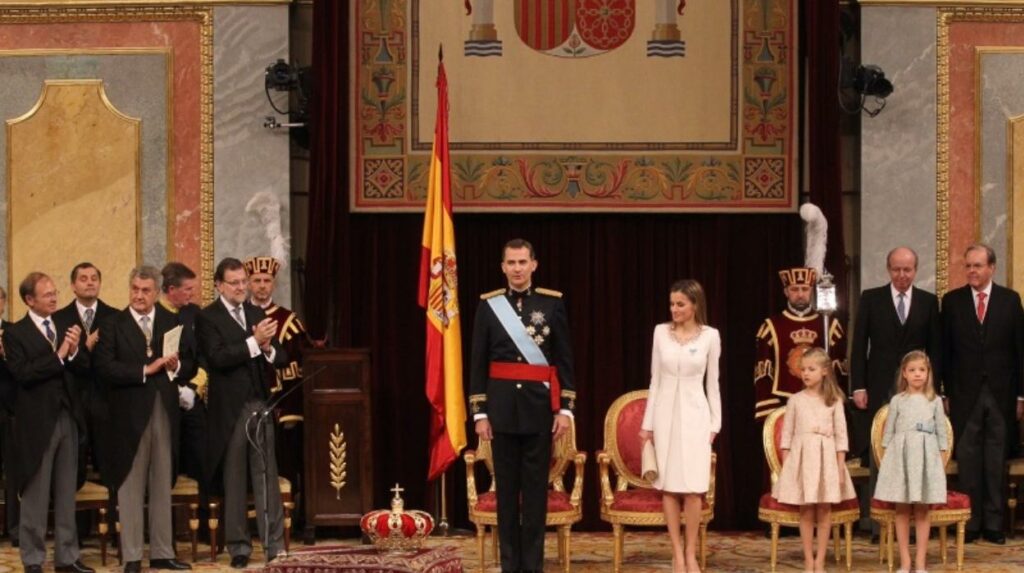
19 June 2014: King Philip VI’s proclamation at the Congress of Deputies[1]
Spain is a parliamentary monarchy, with a head of government (the prime minister) and a head of state (the king). The Spanish Parliament, i.e. the General Courts, holds the country’s legislative power and is bicameral: the upper chamber is the Senate of Spain, based in the Senate Palace in Madrid, while the lower chamber is the Congress of Deputies, based in the Courts Palace in Madrid. The King (or Queen), elected by descent, mainly plays a guarantee role: his power is purely symbolic, since all his acts must in any case be countersigned by the Prime Minister, the competent ministers or the President of the Congress of Deputies.
There are currently 616 members of parliament, 350 in the Congress of Deputies and 266 in the Senate. In general elections, not the president is directly elected, but a parliament, and it is its members who vote for the formation of the executive. To be invested with the presidency, an absolute majority of half plus one of the 350 MPs must vote in favour in a first attempt, or a simple majority (the ‘yes’ votes must be more than the ‘no’ votes, no matter if there are absentees or abstentions) in a second attempt.
And this is why the Popular Party (PP) challenger, Alberto Nuñez Feijóo, despite being the most voted, gaining the consensus of his 137 deputies, fails to get the investiture due to the lack of support from the other parties, especially from Vox and the Unión del Pueblo Navarro (UPN): the votes for him stop at 171. Support, however, was not lacking for Sánchez, who turned his 122 votes into a total of 179, 3 votes above the majority threshold. The support expressed by the left-wing group Sumar – a coalition of some 20 left-wing parties -, the Basque Independents and the Catalan Independents of the ERC was decisive. The outgoing president is therefore back in the saddle, but in a climate of contestation, especially from the PP, which considers the investiture a betrayal of the people’s will and demands a return to the polls obtained by selling out the intangibility of territorial unity and thus betraying the Constitution.
The president’s achievement is in fact characterised by a very articulated and painful path, made up of a series of steps and agreements that highlight the problematic nature of a legislature that is opening not with the best auspices, and is also a novelty in Spanish politics. We are in the presence of a crisis that opened before the vote, like a sudden and great chasm, already in the previous general elections in July.
The July elections
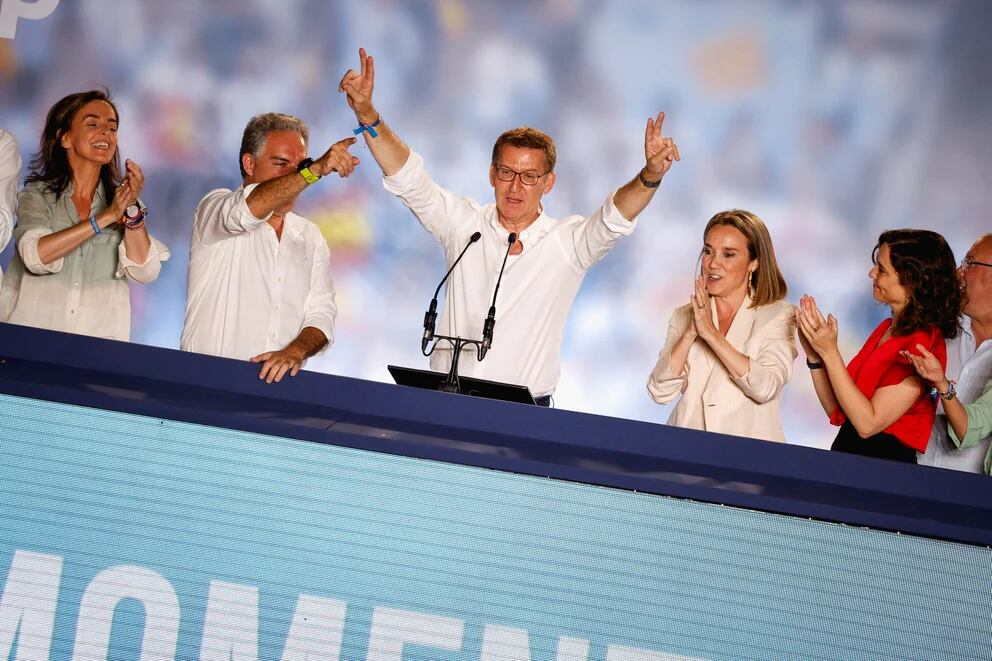
The president of the Popular Party, Alberto Núñez Feijóo, celebrates his electoral victory on 23 July 2023[2]
The real protagonists – in a negative way – of the 23 July elections are the polls: never before have the predictions been completely betrayed by reality. Most of the projections foresee a broad victory for the PP, with over 140 seats and 34.5% of the vote, with the PSOE losing 14 deputies and the sum of the PP and Vox right-wingers over 176 seats, marking an absolute majority[3] .
Not even the polls published on election night (electoral law stipulates that polls cannot be published from the last Monday of the campaign, in this case five days before the elections) manage to correctly attribute the seats to each of the parties separately, although they substantially correct the shot by assigning the PP and Vox a range of 169-177 seats: the estimate for the PP is between 145 and 150 seats, but the result will be 136, while for Vox the estimate is between 24 and 27 deputies, but they will take 33. Same for the PSOE, seen downwards between 113 and 118 while they will have 122. The fact is that none of the blocs, either left or right, will reach an absolute majority.
The result is therefore a surprise for everyone, both for the outgoing president but above all for the oppositions, with Santiago Abascal of Vox convinced he could play a pivotal role in forming the government with Alberto Núñez Feijóo: the loss of 19 of his 52 seats condemns him to irrelevance. The collapse of support for Vox is largely explained by the estrangement of that electorate belonging to two fiefdoms, Castilla and León, but important defections also occur in Murcia, Extremadura as well as in the Valencian Community and in Andalusia[4] : the only front to hold out is Catalonia.
The numbers, however, did not prove Pedro Sánchez right either and on 25 July he threw in the towel: the parliament, also in its second attempt, did not elect him, granting him only 124 votes in favour and 155 against, with 67 abstentions. Support from the other political forces did not arrive, especially the support of Unidas Podemos, which demanded control of several ministries in return, an unacceptable demand for Sánchez.
The law provides, in such cases, for a second vote to be held on 27 September. After a series of frantic meetings, intense talks and the search for agreements[5] , a new vote is held but, after losing the first round on the 27th, the result of the next one held on 29 September, 178 against and 172 in favour, also punishes PP leader Alberto Núñez Feijóo. The new vote is set for November.
Amnesty for votes
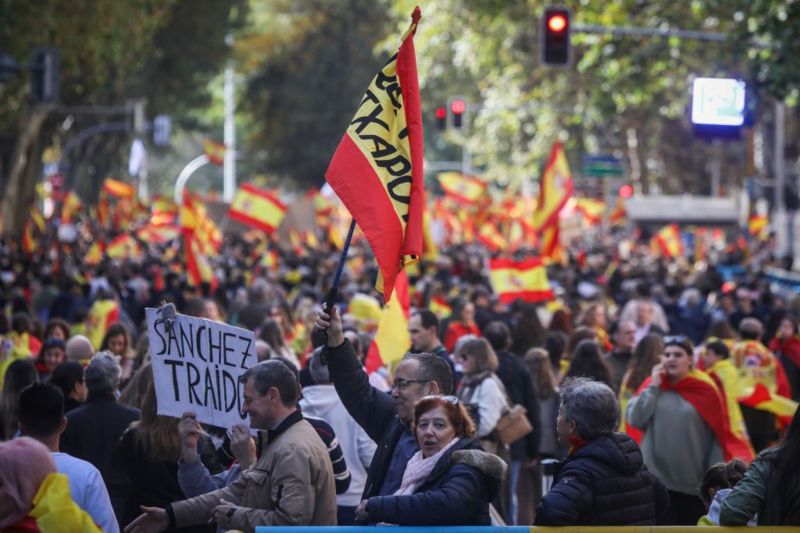
Protests in Madrid against the amnesty law[6]
In an increasingly heated climate, in the inter-party negotiations[7] the negotiations launched by Sánchez to obtain the support of Junts per Catalunya – the independence party of Carles Puigdemont – through concessions contested by the opposition, including amnesty for offences committed in connection with the unilateral declaration of independence and the unilateral consultation held in Catalonia on 1 October 2017, now stand out[8] .
After months of discussion and speculation, the text of the amnesty bill was made public on 12 November: the proposal stipulates that persons who have committed crimes and have been prosecuted and convicted, will be amnestied for offences committed from 1 January 2012, when the events of the independence process begin to take place, until 13 November 2023, and this will affect around 400 beneficiaries divided between 300 Independents and 73 police officers[9] .
The amnestied offences will be those of ‘misappropriation, terrorism, as well as public disorder related to the process of independence’ and will concern those who ‘have provided assistance, collaboration, advice of any kind, representation, protection or security to subjects responsible for conduct’; amnesty will also be granted for offences of usurpation of public functions and those of disobedience and attempt and resistance to authority. Also amnestied will be ‘acts of thoughtlessness or criticism expressed against authorities and public officials’ committed in demonstrations and artistic activities claiming the independence of Catalonia[10] . Excluded from the amnesty will be anyone who has committed intentional acts against people, those who are ‘convicted of terrorist offences and perpetrators of torture and inhuman treatment, as long as they exceed a minimum threshold of seriousness, or those who have committed crimes of treason and against peace’[11] .
Among the first illustrious pardoned will be the leader of Junts per Catalunya, Carles Puigdemont, guilty, as president of the Generalitat de Catalunya, of declaring Catalonia’s independence from Spain immediately after the result of the referendum on 1 October 2017 (90% ‘yes’ vote with 2.2 million votes and a 42% turnout): as a consequence, Mariano Rajoy, the then Spanish Prime Minister, invoked Article 155 of the Constitution, which provides for the immediate commissioner of Catalonia and the dismissal of Puigdemont and his government[12] . Convictions for rebellion, sedition and embezzlement will be issued against him: wanted by the Spanish authorities, he takes refuge in Brussels together with four other former councillors and, despite his forced exile, for the independentists he continues to remain the President of the self-proclaimed Catalan Republic, even without a formal investiture[13] .
The proposal provoked a wave of legal, parliamentary and street protests by the Spanish extreme right and various groups such as some bishops, employers’ associations, associations of judges and the Guardia Civil, as well as associations of high public officials such as tax inspectors and some members of the country’s most elite law firms.
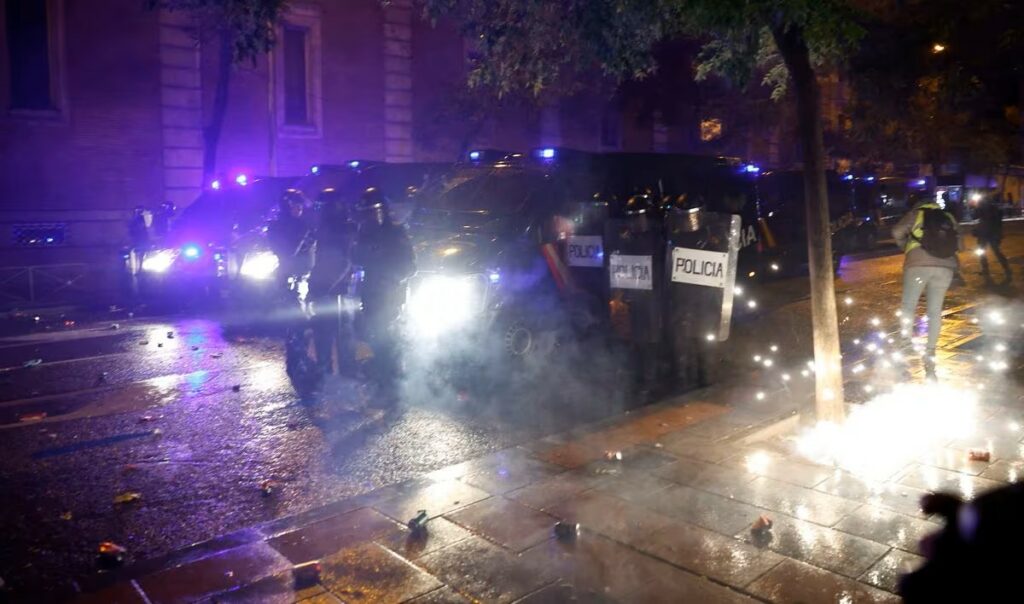
Protests in front of PSOE headquarters shouting ‘Puigdemont in jail’ and ‘Madrid will be the grave of Sanchismo’[14]
The leader of the Partido Popular, Alberto Núñez Feijóo, goes so far as to claim that the PSOE’s pacts with the pro-independence movement are even more serious than the terrorism of 23-F (also known as the Tejero coup of 23 February 1981) or ETA. It accuses the PSOE of violating the principle of the separation of powers, since with the pacts the government would assume not only the natural executive power, but also legislative and judicial power, and violate the basic principles of democracy. He accuses him of ‘shattering Spain’, a ‘coup d’état’ as well as electoral fraud. Santiago Abascal, president of Vox, even goes so far as to compare Sánchez to Hitler[15] .
In spite of the protests, Pedro Sánchez goes straight ahead and on 16 November the agreements are signed, so that a new government has a majority in parliament: the most complex and controversial phase since the return of democracy to Spain opened on 23 July closes. Supporting the PSOE are the deputies of the Sumar coalition (with whom Sanchez came to terms, promising them the reduction of the working day from 40 hours a week to 37.5, as well as other details in the labour sphere[16] ) and the representatives of all the nationalist forces, both independentist and moderate: the president thus obtains 179 votes, 3 above the minimum threshold, while the PP together with Vox and the Union del Pueblo Navarro do not go beyond 171 votes.
But in the agreement[17] with Junt per Catalunya, in addition to the amnesty – also approved by ERC, the Esquerra Republicana de Catalunya[18] – other very important measures are enshrined, including a) the expansion of Catalonia’s direct participation in European institutions and other international organisations and bodies; b) the opening of the consensus to hold a referendum on self-determination and the amendment of the law on the financing of autonomous communities c) the cession by the Spanish state to Catalonia of 100 per cent of the taxes paid in its territory; d) the commitment to an extensive development of the regional statute approved in 2006 and measures that would allow the financial autonomy of Catalonia and its autonomous access to the market[19] ; e) the remission or reduction of Catalonia’s debt with the Autonomous Liquidity Fund (FLA) of 15.000 million, a 20% reduction of the debt to approximately 58,110 million from the current 73,110[20] .
A door has been opened through which all independence movements now pass: the agreements reached with the Galician Nationalist Bloc (BNG), the Coalition of the Canary Islands (CC) and the Basque Nationalist and Independence Party Bildu range from the expansion of workers’ rights to debt forgiveness, transfer of power or the expansion of resources[21] .
The agreement with the Basque independentists of the Partido Nacionalista Vasco (PNV) includes thirty measures[22] : among the most important is the commitment to advance Basque self-government with the fulfilment of the transfer of pending powers established in the Statute of Gernika[23] within a “nonextendable” period of two years and anticipating the future self-government: one of these pending transfers is that of Social Security[24] . Then there is the commitment on the ‘national recognition of the Euskadi (Basque Country)’, the safeguarding of Basque powers and a system of guarantees based on bilaterality and respect for the regional rights of the Basque territories. Then there is the Socialists’ promise to amend the Workers’ Statute so that Basque labour contracts prevail over state contracts, a historical demand of Basque nationalists. In addition, the powers of the Ertzaintza, the autonomous Basque police force, will be expanded[25] .
A complicated future

Evolution of economic indicators between the end of the Rajoy government (2018) and the Sánchez government (2022-2023)[26]
There is no doubt about it: since 2 June 2018, the day the first coalition government led by PSOE leader Sánchez took office, in addition to the growing economy and falling inflation, all the major social indicators see positive progress compared to the previous PP government, yet in these four years the opposition does not stop giving the government a hard time, accusing it of being illegitimate[27] , a behaviour that severely limits the democratic game, degrading the debate and provoking strong polarisation, a climate to which Spain is not used to: the normal government-opposition dialectic is thus transformed into a constant electoral campaign.
This climate has contributed to creating false expectations and misperceptions of the balance in the consensus. But the right-wing’s barricading attitude, though rewarded by the voters, inexorably fails in the art of agreement, an activity in which Sanchez shows greater mastery, albeit at a high price. In these hours, during which protests against the amnesty are multiplying, filling streets and blocking highways, the government appointments are being finalised, among which women stand out, in greater numbers than men (12 to 10), as well as four female vice-presidents. Five ministries go to Sumar[28] .
In fact it is a government of continuity, where social policies remain the protagonists. But the future of this government is anything but a foregone conclusion, as it will constantly have to reconcile the demands and expectations of the coalition parties, and the compromises do not look easy to reach, with the oppositions that will certainly give no respite and will exploit every slightest défaillance to obstruct its path.
The support of the Basque and Catalan nationalist parties could influence central government policies on the issues of regional autonomy and cultural rights, leading to further decentralisation or at least a change in the central government’s interaction policies with the regions. This new set-up is likely to ignite new internal challenges as the response of citizens to policies supporting independence is by no means a foregone conclusion. The unfavourable international economic situation could further complicate a growth threatened by a progressive increase in public spending, a central theme in social policies that Sanchez has no intention of giving up.
But the strength demonstrated by Sánchez in all his mandates lies precisely in his ability to mediate and dialogue even in the most difficult situations. The openness to Catalan independence, the real novelty of this legislature, could also lead to the definitive resolution of an enduring conflict, in complete rupture with previous governments, such as that of Mariano Rajoy, for whom Catalan independence is only seen as a matter of public order.
ESP026
[1] https://www.abc.es/espana/casa-real/abci-monarquia-parlamentaria-mas-necesaria-nunca-202011031349_noticia.html?ref=https%3A%2F%2Fwww.google.com%2F
[2] https://www.infobae.com/espana/2023/07/23/fotogaleria-del-23-j-las-elecciones-generales-2023-desde-la-apertura-de-los-colegios-a-la-fiesta-o-el-duelo-en-las-sedes/
[3] https://www.rtve.es/noticias/20230724/fallan-encuestas-elecciones-generales-23j/2448077.shtml
[4] https://www.elmundo.es/elecciones/elecciones-generales/2023/07/24/64bd5dece85ecef82b8b45c9.html
[5] https://elpais.com/espana/2023-09-18/ultimas-noticias-de-la-investidura-de-feijoo-y-formacion-de-gobierno-en-directo.html
[6] https://www.bbc.com/mundo/articles/cgep52vpv5xo
[7] https://legrandcontinent.eu/it/2023/11/14/sanchez-e-lamnistia-la-spagna-ritrova-la-catalogna/
[8] https://www.bbc.com/mundo/noticias-internacional-50039937
[9] https://www.20minutos.es/noticia/5189952/0/las-dudas-certezas-ley-amnistia-que-pasara-con-puigdemont-se-incluiran-los-casos-corrupcion/
[10] https://www.20minutos.es/noticia/5189952/0/las-dudas-certezas-ley-amnistia-que-pasara-con-puigdemont-se-incluiran-los-casos-corrupcion/
[11] https://www.20minutos.es/noticia/5189952/0/las-dudas-certezas-ley-amnistia-que-pasara-con-puigdemont-se-incluiran-los-casos-corrupcion/
[12] https://www.enciclopedia.cat/gran-enciclopedia-catalana/carles-puigdemont-i-casamajo
[13] https://www.enciclopedia.cat/gran-enciclopedia-catalana/carles-puigdemont-i-casamajo
[14] https://elpais.com/espana/2023-11-10/pactos-y-negociaciones-para-la-investidura-de-sanchez.html
[15] https://www.lavanguardia.com/politica/20231115/9381095/abascal-compara-sanchez-hitler-cree-ley-amnistia-da-golpe.html
[16] https://www.rtve.es/noticias/20231024/reduccion-jornada-laboral-subida-salario-minimo-acuerdo-psoe-sumar/2459079.shtml
[17] https://www.newtral.es/wp-content/uploads/2023/11/231107-Acuerdo-PSOE-Junts.pdf?x73247
[18] https://www.newtral.es/erc-proposicion-ley-amnistia-psoe/20231102/
[19] https://www.newtral.es/wp-content/uploads/2023/11/231107-Acuerdo-PSOE-Junts.pdf?x73247
[20] https://www.rtve.es/noticias/20231113/precio-investidura-pactado-sanchez-cambio-votos-presidente/2460699.shtml
[21] https://www.bbc.com/mundo/articles/cgep52vpv5xo
[22] https://www.newtral.es/wp-content/uploads/2023/11/ACUERDO-PSOE-EAJ-PNV-101112.pdf?x73247
[23] https://www.euskadi.eus/contenidos/informacion/estatuto_de_gernika/es_def/adjuntos/competencias_euskadi.pdf
[24] https://www.rtve.es/noticias/20231110/claves-acuerdo-psoe-pnv/2460565.shtml
[25] https://www.rtve.es/noticias/20231110/claves-acuerdo-psoe-pnv/2460565.shtml
[26] https://legrandcontinent.eu/fr/2023/07/21/comment-la-droite-espagnole-est-devenue-trumpiste/
[27] https://legrandcontinent.eu/fr/2023/07/21/comment-la-droite-espagnole-est-devenue-trumpiste/
[28] https://www.newtral.es/nuevos-ministros-pedro-sanchez/20231120/

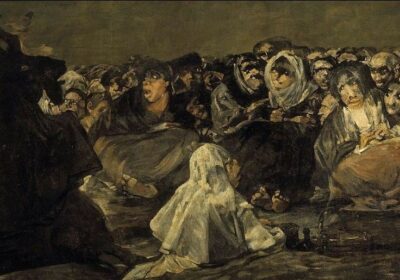
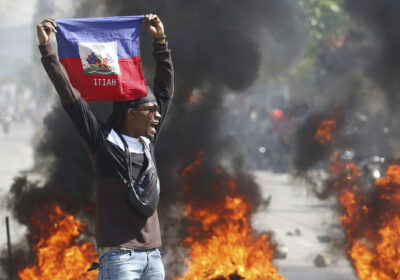
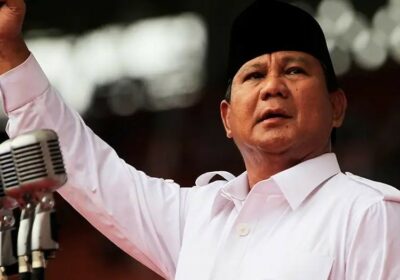
Leave a Reply